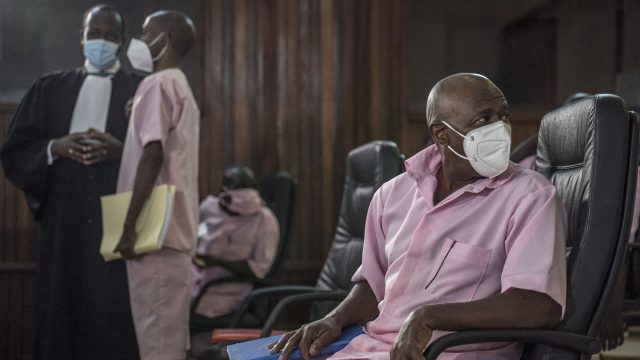By AFP
(FILES) In this file photo taken on February 17, 2021 Paul Rusesabagina looks on as he sits with some of his coaccused at the Supreme Court in Kigali where he is facing charges related to their association with Mouvement Rwandais pour le changement démocratique (MRCD) and its armed wing FLN. – The mild-mannered hero of “Hotel Rwanda” credited with saving hundreds of lives during the 1994 genocide, Paul Rusesabagina evolved into Kigali’s sharpest-tongued critic before being tried for terrorism. The unassuming hotel manager in a smartly-pressed suit became the world’s most famous Rwandan after the film’s release, but angered his government by using the Hollywood limelight to crusade for political change in his tightly-controlled homeland. (Photo by Simon Wohlfahrt / AFP)
A court will deliver its verdict Friday against Paul Rusesabagina, the “Hotel Rwanda” hero turned government critic, who is charged with terrorism in a trial supporters say is politically motivated.
Prosecutors have sought a life sentence for Rusesabagina, the 67-year-old former hotelier credited with saving hundreds of lives during the 1994 genocide, and whose bravery inspired the Hollywood film.
Rusesabagina, who used his subsequent celebrity to denounce Rwandan leader Paul Kagame as a dictator, was arrested in August 2020 when a plane he believed was bound for Burundi landed instead in Kigali.
His family say Rusesabagina was kidnapped and have dismissed the nine charges against him, including terrorism, as payback by a vengeful government for his outspoken views.
The hearings against Rusesabagina and 20 other defendants started in February.
But Rusesabagina, a Belgian citizen and US green card holder, has boycotted the trial since March, accusing the court of “unfairness and a lack of independence”.
“Any questions of a legal case or a trial are an impolite fiction — a show put on by the Rwandan government to silence a critic and chill future dissent,” the Hotel Rwanda Rusesabagina Foundation, a charity founded by him, said in June.
The United States, the European parliament, and Belgium have raised concerns about his transfer to Rwanda and the fairness of his trial.
“In a country where freedom is limited, all power rests in the hands of the executive. How would a judge dare make a decision inconsistent with the desires of the President of the Republic?” opposition leader Victoire Ingabire, who spent six years in prison for terrorism, told AFP.
The judge presiding over the case, Antoine Muhima, has defended the proceedings, saying none of the accused has been denied the right to speak.
Hero to villain Rusesabagina was the former manager of the Hotel des Mille Collines in Kigali, where he sheltered hundreds of guests during the genocide that left 800,000 people dead, mostly ethnic Tutsis.
A decade later the American actor Don Cheadle played Rusesabagina, a moderate Hutu, in the Oscar-nominated blockbuster that brought his story to an international audience.
Rusesabagina soon became disillusioned with the new Tutsi-dominated government led by Kagame, the rebel-leader-turned president whose forces ended the killings.
He accused Kagame of authoritarian tendencies and left Rwanda in 1996, living in Belgium and then the United States.
Abroad, he used his global platform to crusade for political change in Kigali, and developed close ties with opposition groups in exile.
Kagame’s government accuses Rusesabagina of supporting the National Liberation Front (FLN), a rebel group which is blamed for attacks inside Rwanda in 2018 and 2019 that killed nine people.
“Must Africans/Rwandans not protect themselves from armed group attacks organised by dissidents? Or must innocent civilian victims be denied justice because one of 21 suspects is famous abroad?” Kagame’s spokeswoman, Yolande Makolo, posted on Twitter on Sunday.
Rusesabagina has denied any involvement in the attacks but was a founder of the Rwandan Movement for Democratic Change (MRCD), an opposition group of which the FLN is seen as the armed wing.
Seeking a life term, prosecutors in June said Rusesabagina “encouraged and empowered the fighters to commit those terrorist acts”.
But his co-defendants gave conflicting testimony over the level of Rusesabagina’s involvement with the FLN and its fighters.
His family has campaigned globally for his release, saying Rusesabagina is a political prisoner, and accusing Rwandan authorities of torturing him in custody.
In July, a media investigation claimed that Rusesabagina’s daughter, Carine Kanimba, was spied on using Pegasus malware developed by Israeli company NSO.
Investigators confirmed that a cell phone belonging to Kanimba, a US-Belgian dual national, had been compromised multiple times.

